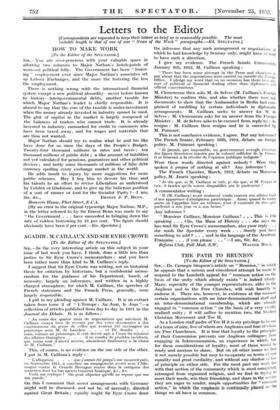Letters to the Editor
[Correspondents are requested to keep their letters as brief as is reasonably possible. The most suitable length is that of one of our "News of the Week" paragraphs.—Ed. SPECTA.TORA
HOW TO MAKE WORK
[To the Editor of the SPECTATOR.] SIR,—You are over-generous with your valuable space in allotting two columns to Major Nathan's hotch-potch of worn-out political folly. The Government has been " foster- ing " employment ever since Major Nathan's associates set up Labour Exchanges, and the more the fostering the less the employment.
There is nothing wrong with the international financial system except a new political absurdity—never before known to history—intergovernmental debts, another trouble for which Major Nathan's leader is chiefly responsible. It is absurd to say that the core of the trouble is under-investment when the money already invested in industry cannot be used. The glut of capital in the market is largely composed of the balances of traders who cannot trade. It is already invested in industry, earmarked for credit to customers who have been taxed away, and for wages and materials that are thus not wanted.
Major Nathan should try to realize what he and his like have done for us since the days of the People's Budget. Twenty-four thousand millions in rates and taxes ; ten thousand millions of public debt ; a like amount of liabilities not yet calculated for pensions, guarantees and other political devices ; and lastly some thousands of millions of false debt currency spoiling every exchange market in the world.
He adds insult to injury by more suggestions for more public schemes. May I beg him to devote his time and his talents to an effort to revive Liberalism as understood by Cobden or Gladstone, and to give up the ludicrous position of a sort of runner or tout for the Socialist Party ?—I am, Bouverie House, Fleet Street, E.C.4.
[By an error in the original typescript Major Nathan, M.P., in the letter referred to by Sir Ernest Benn was made to say "the Government . . . have succeeded in bringing down the rate of riskless borrowing by 21 per cent. The figure should obviously have been 2 per cent.—En. Spectator.]






































 Previous page
Previous page